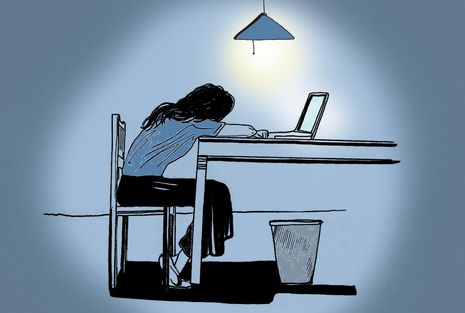Cambridge Survivors: Testimonies for change
Amidst recent outcry over prevalent rape culture in Universities, Cambridge Survivors introduce their initiative to shed light on the often forgotten ‘closeted’ victims and, most importantly, to provide an alternative source of support

Content Note: This article contains discussion of sexual harassment, assault, violence and abuse and misconduct procedures.
Listening to survivors’ voices is the only way we can build an opposition to rape culture: this is the premise of the countless survivor testimony accounts currently active on social media. The most high-profile example is the site, ’Everyone’s Invited’, which shares survivor accounts of abuse in order to provide an evidential directory of “the complex and pervasive reality of rape culture.” Everyone’s Invited, along with other Instagram testimonial accounts from individual universities and schools, has sent shockwaves across the country and upturned the way many perceive sexual violence.
Too often, we hear about survivors’ experiences in detached statistical terms, or in the context of sensationalist journalistic narratives: testimony accounts give survivors autonomy over their own stories, and allow those reading to understand the long-term, structural impact that sexual violence has outside of the whims of the newscycle. It amounts to a grassroots movement, exploiting the independent platforms offered by social media to give survivors a safe, affirming and supportive space to regain control over their own narrative.
“While sexual violence is an act which relies on silencing and gaslighting its victims, testimony accounts offer an acknowledgement that any reform and activism we advance must be based on listening to survivors”
While sexual violence is an act which relies on silencing and gaslighting its victims, often depriving them of their agency or vilifying them for exercising it, testimony accounts offer an acknowledgement that any reform and activism we advance must be based on listening to survivors, and offering opportunities for holding perpetrators to account in a way that reduces the burden on survivors. They also offer the potential for the large proportion of ‘closeted’ survivors - survivors who do not wish to publicly come out about their experiences or tell the people around them - to have a forum to share their stories.
Following the impact of such campaigns as St Andrews Survivors, which has successfully lobbied for survivor-oriented change across the University, and Everyone’s Invited, which has at the time of writing received almost 16,000 testimonies from across the country, Cambridge Survivors has been set up across Facebook and Instagram as a means of platforming survivor voices in our community, and of ensuring that our activism remains grounded in the perspectives and wishes of the people who have experienced violence.
We want the account to make it impossible for the University not to hear us. Victim-survivors make up a vast portion of the student body, and yet universities and schools, including Cambridge, have been consistently resistant to soliciting our feedback, experiences and demands, whilst official procedures to this day still rely upon a one-size-fits-all approach to those who decide to report their experiences, disregarding the heterogeneity of survivors’ wishes. The necessity of anonymity for survivors makes a lot of traditional activism impossible for them, meaning that students often underestimate the scale of the problem of rape culture and exclude closeted survivors from conversations about sexual assault. Even when viable solutions are suggested, for instance ‘victim representatives’ on committees and campaigns to increase visibility, in practice, they often neither meet the standards of safety nor the anonymity necessary for a majority of survivors. Our account, which will make the extent of the issue plain and irrefutable, should act as a powerful reminder to put our voices first in discussions about rape culture and reform.
“Our primary aims will always be to support survivors, to act on their feedback and to provide them with an unconditional and affirming space to tell their stories”
However, insofar as our secondary aims might be to educate students and staff alike, our primary aims will always be to support survivors, to act on their feedback and to provide them with an unconditional and affirming space to tell their stories. We will never claim to be a ‘voice for survivors’, as some campaigns are wont to do: each of us has our own voice, and we understand that we will never be able to represent the diversity of experiences, views and outlooks among our community. We will allow their words to stand alone, without presuming the background, worldview or beliefs of the victim.
We welcome testimonies from anyone who has experienced sexual misconduct of any form who wants their experience to be listened to. Alongside testimonies, you will be able to submit anonymous affirmations to the survivors who have shared their stories, which will be moderated by our admin team to ensure that the page remains a safe space. Identifying details will never be published, and we have a robust system in place for you to retract any testimony that you regret submitting. We also offer the option to include the name of the perpetrator and to be linked up with other victims of that person, which will allow victims to show solidarity with each other, to feel validated in their experiences, and, if they wish, to report the incident with a higher chance of the desired outcome than they would have alone.
But formal reporting is not our priority. We believe that victim-survivors should be able to access necessary support and adjustments without coming out about their experience. We believe that the burden of change should not fall upon victim-survivors, and yet we believe that the presence of their stories in forums of reform and change is absolutely necessary.
As survivors ourselves, we know how difficult it is to feel heard, but we firmly believe that we should be listened to. We hope this account can be our chance.
To read and submit testimonies, visit our social media accounts here:
Instagram - https://www.instagram.com/cambridgesurvivors/
Facebook - https://www.facebook.com/Cambridge-Survivors-106771531492300
If you are affected by any of the issues raised in this article, the following organisations provide support and resources:
- Breaking the Silence: the University’s campaign against harassment and sexual misconduct (includes reporting mechanisms).
- Sexual Assault and Harassment Adviser: specialist University support worker who provides emotional and practical support
- Cambridge for Consent: a student-run campaign to promote consent.
- Cambridge Rape Crisis Centre: a charity for female victims of sexual violence (helpline number: 01223 245888).
- Cambridge Nightline: a confidential night-time listening service.
- Students’ Unions’ Advice Service: the Students’ Unions’ confidential, independent and impartial advice service.
- Samaritans: a charity providing a 24 hour helpline for emotional support (helpline: 116 123)
 News / Cambridge academics sign open letter criticising research funding changes22 February 2026
News / Cambridge academics sign open letter criticising research funding changes22 February 2026 News / Student and union protesters hold ‘Trans Liberation Solidarity Rally’ 24 February 2026
News / Student and union protesters hold ‘Trans Liberation Solidarity Rally’ 24 February 2026 News / Union speakers condemn ‘hateful’ Katie Hopkins speech14 February 2026
News / Union speakers condemn ‘hateful’ Katie Hopkins speech14 February 2026 Features / Beyond the porters’ lodge: is life better outside college?24 February 2026
Features / Beyond the porters’ lodge: is life better outside college?24 February 2026 Theatre / Footlights Spring Revue? Don’t Mind if I Do!25 February 2026
Theatre / Footlights Spring Revue? Don’t Mind if I Do!25 February 2026









